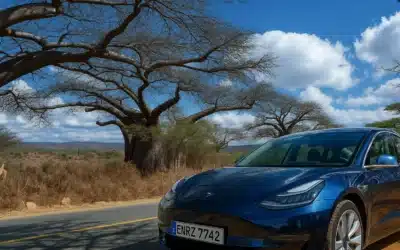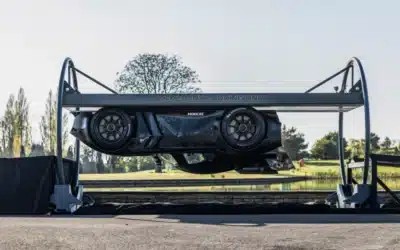So-called ‘Range Anxiety’ remains one of the biggest stumbling blocks for motorists potentially switching over to electric vehicles. The reality is that most drivers don’t need as much range as they think they do. Typical daily mileages are generally less than 100km, and most current electric vehicles will already do well over 200km on a single charge.
Some of the longest available ranges come from cars like the Mercedes EQS 450, which can do over 725km on a single charge (452 miles). While the current global top-selling EV, the Tesla Model Y, can do up to 513km (319 miles). To be fair, in the real world, you may see a shorter range depending on a variety of conditions, including driving style, traffic, weather etc. Even so, most new EVs clearly have sufficient range for the majority of drivers.
Yet the discussion around range persists, not least because when you do run low, it generally takes about 30-45 minutes to charge back up to around 80%, and this is perceived to be a bit of a pain. So, the race to 1000 miles (1600km) of range, continues.
How close are we? The problem is the longer the range, the bigger the battery, the heavier the car, the more energy is needed to move that car, and the quicker you’ll drain that same battery. Cleverer solutions are needed to solve this particular conundrum, involving technical innovation, lighter weight, better aerodynamics and very possibly a completely different type of battery.
In fact, the 1000-mile range EV is already a reality. Aptera Motors in California has an electric vehicle that can do 1000 miles (1600km). It is already being offered for sale on their website for prices between $26,000-$46,000, though deliveries are not expected till late 2024.
It’s described as a solar electric car, as it uses solar panels to boost its range. Some 40 miles a day is achievable purely powered by the Sun. It is a three-wheeler, two-seater with a unique teardrop shape that makes it look more like a light aircraft sans-wings than a recognisable car. This gives it an astonishing aerodynamic drag coefficient of just 0.13Cd. For most though, it will prove impractical and too much of a novelty compared to a conventional passenger vehicle.

Aptera is a solar electric vehicle that requires no charging for most daily use. It has a limited production run, so get in fast if you want one!
Meanwhile Mercedes last year demonstrated its ability to achieve near-1000 miles by driving 1202km (747 miles) in its EQXX concept car. Again, it’s not expected to go on sale until next year.
Along with improved aero, light weight is a major concern, and one of the techniques to address that is EV platforms that feature ‘in-wheel’ motors. This substantially reduces the number of drivetrain components, thereby reducing weight. It also results in better packaging, which of course frees up space for more batteries. Battery tech itself remains key however, in any attempt to achieve the golden target of 1000 miles.
Gotion High-Tech, earlier this year revealed an EV battery with a range of 1000km (620 miles) and the Chinese company has tied up with Volkswagen with production mooted for around 2024-25. The battery uses lithium Iron Manganese Phosphate (LMFP) technology for greater energy density.
Remixing the constituents of battery packs and trying different layouts and assembly techniques could improve ranges. On the other hand, the secret could lie in a completely different type of battery.

The Mercedes-Benz Vision EQXX, expected to go on sale in 2024, achieved a drive range of 1202km.
To many observers it appears that the world’s largest car-maker, Japanese giant, Toyota, has been caught out when it comes to the EV revolution, only now joining the party with cars like the new RAV4-sized bZ4X, jointly developed with Subaru. This despite the fact that Toyota, along with Honda, were both ahead of the curve when it came to hybrid technology with cars like the Prius and Insight respectively.
While both companies have been exploring the hydrogen-power option (and indeed continue to do so), it’s also looking likely that Toyota will leapfrog EV rivals with the first solid-state battery brought to market.
Prior to that though, around 2026, it appears to want to make a firm statement of intent with new high-density lithium iron phosphate batteries that will cut the price of its EVs by as much as 40% and yet increase the range by up to 20%. These are just the warm-up act though. In partnership with Panasonic, it has 200 engineers working on over 1000 solid-state battery patents, more than any other car company.

Toyota’s bZ4X, jointly developed with Subaru, will help the marque play catch-up in the mainstream EV market.
As the name suggests, the new battery packs will employ solid (sulphur-based) electrolytes as opposed to liquid, and advantages include lower risk of fire, and far better energy density and efficiency. It’s obviously too early for exact numbers, but potentially these solid-state batteries could result in charging times of just 10 minutes to 80%, and much bigger ranges. Estimates suggest over 1500km (932 miles).
Toyota has a stated aim of being the first company to sell an electric vehicle equipped with a solid-state battery by the mid-2020s. Realistically, expect to see Toyotas with solid-state batteries around 2027-2028.
Honda isn’t far behind either. It has teamed up with General Motors and Sony, and is focussing on beating dendrites. This is lithium metal build-up that can slow the battery’s charging and power output over time. The company is introducing a polymer fabric buffer layer that will curtain dendrites and extend battery life by an estimated 10 years.
As for the question posed at the top of this article, “who will be first to offer an EV with a 1000-mile range?” it will probably be the Aptera if you accept a vehicle that looks like it belongs in either a Jetsons cartoon or a Sean Connery-era 007 movie.
Realistically though, watch closely for new models from Mercedes, Volkswagen and the big Chinese firms, but don’t count Tesla out just yet. At this point though, it seems most likely that Toyota could well pip them all to the post and give us the most usable, and longest range EV yet, by the late 20s.
Stay tuned!











